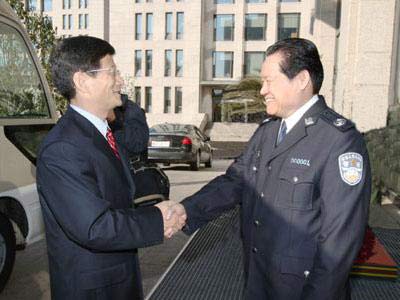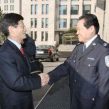
Year-End Questions on Political-Legal Reform
Publication: China Brief Volume: 12 Issue: 24
By:

At the conclusion of the 18th Party Congress on November 15, the announcement of China’s new leadership offered few glimpses of the possibility of reform in the next five years. The one area, however, where reform is evident appears to be the one part of the Chinese system most resistant to change. The reduction of the Chinese Communist Party (CCP) Politburo Standing Committee from nine members to seven members pushed the internal security portfolio back down to the Politburo, ostensibly reducing the power and influence of the secretary of the Central Political-Legal Committee (Xinhua, November 15). Elsewhere, Beijing issued a judicial reform white paper that suggested a reduced role for the party in determining how Chinese citizens are processed (Xinhua, October 9). While all signs point to a conservative CCP leadership, there is at least one area where some reform may be in the offing.
The controversy surrounding former Political-Legal Committee Secretary Zhou Yongkang and his relationship with the ousted Bo Xilai is difficult to parse to evaluate whether Zhou’s supposedly out-of-control power is the cause of these reforms. For example, journalists reported Zhou had disappeared in March indicating he may follow Bo into CCP purgatory. Yet, during that month, Zhou appeared more than he had in the previous three months combined (“Zhou Yongkang and the Tarnished Reputation of China’s Police,” China Brief, March 30; China Leadership Monitor, No. 38, August 6). Moreover, it is difficult to read much in Zhou’s bland, perhaps obligatory, paeans of Bo’s “Strike the Black” (dahei) campaigns. The brevity of national media assessments versus those of Chongqing’s outlets suggests Bo’s efforts to play up Zhou’s support for his own purposes (Chongqing Daily, March 14, 2010; Xinhua, October 30, 2009). If Zhou’s outsized authority were all that were at stake, then the limits of political-legal reform should be easy to spot and easier for the CCP to finish: the replacement of Zhou Yongkang, which did proceed on schedule.
Although the demotion of the Central Political-Legal Committee secretary to the Politburo is a definite sign of change, there are still a number of lingering questions about the extent to which the party may restructure the political-legal apparatus. Under now-CCP General Secretary Xi Jinping’s leadership, the Central Party School published a series of articles over the summer examining contradictions in the social management and internal security apparatus, signaling future changes to the political-legal system (“Portents of Change in China’s Social Management,” China Brief, August 3). One of the central contentions was that the dominance of the Central Political-Legal Committee meant that the police approach overrode the softer elements of social management (Study Times, June 18). If the Central Party School’s assessments hold true and the CCP sees the problem as more fundamental than just one personality, then observers should keep their eyes peeled for other signs of change.
First, during the 2000s, the CCP created the Office of Preserving Stability to execute the directives of the Preserving Stability Leading Small Group. At each level—national, provincial and local—the office brings together public security, state security and procuratorate elements outside the state structure and under the party. This is not unlike the 610 Office system created to pursue the Falun Gong (“The 610 Office: Policing the Chinese Spirit,” China Brief, September 16, 2011). The question is who will take over this apparatus and whether it will continue to exist under the leadership of the Political-Legal Committee secretary—the massive internal security budget (roughly $110 billion) may be too much for a mere Politburo member.
Second, the latest rumors of reform in China’s ministerial structure surprisingly included a change to the management of the Ministry of State Security (MSS)—the civilian internal and external intelligence service—placing it entirely under the State Council (Asia Sentinel, December 5). Moving the MSS away from the Political-Legal Committee structure will further weaken Meng and his successors, but it could offer opportunities for the MSS to focus on foreign intelligence and counterintelligence concerns rather than competing directly within the same administrative system with the politically more-powerful MPS. Although a seemingly innocuous change, it could have a significant effect on the evolution of China’s intelligence apparatus.
Third, looking ahead to the National People’s Congress meeting in March when ministerial posts are assigned and Meng Jianzhu is replaced as the minister of public security, who will replace him and what will the MPS front office look like? Meng, like his recent predecessors, was, first, a political heavyweight before going to the MPS (Xinhua, November 19). Real reform of internal security would entail the de-politicization of senior MPS positions—many MPS vice ministers also have prior non-police careers—reducing the ministry’s relevance as a factional prize and tool. This may sound idealistic, but this approach appears to have isolated the MSS successfully from politics apart from exceptional circumstances as it was intended (Ming Pao [Hong Kong], April 28, 1995; Xinhua, June 30, 1979). Moreover, it is worth noting Bo Xilai relied on Wang Lijun, a public security official, for his dirty work rather than state security and it was an MSS vice minister who escorted Wang back to Beijing.
Some of these questions will resolve themselves in the weeks and months ahead; however, others, like the evolution of the internal security ministries and their associated party offices, will continue to be important long after the personnel changes at the National People’s Congress in March.





